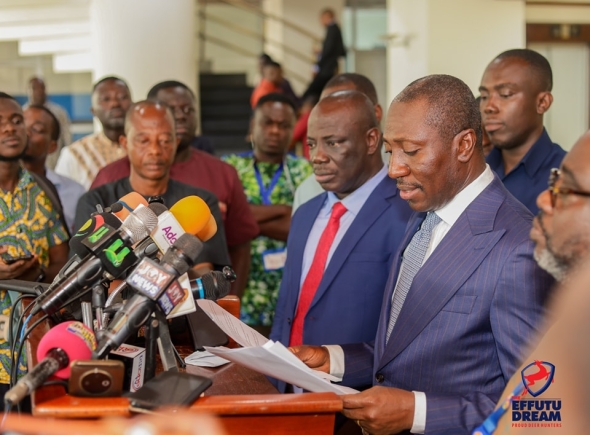
Tamale High Court order for re-run of Kpandai elections bad precedent for electoral chaos - Minority caucus
The Minority Leader in Parliament, Alexander Afenyo-Markin, has described the order by the Tamale High Court for the re-run of the entire 152 polling stations of the Kpandai parliamentary election within 30 days as a bad precedent that will be exploited to create future electoral chaos.
The Minority caucus at a press conference on Wednesday afternoon [Nov 26, 2025] said the judge had sent an unmistakable message to every political mischief maker and electoral saboteur in Ghana to engage in electoral violence to have their way.
“Create confusion in a few polling stations, destroy materials, disrupt, trigger controversy, and you may be rewarded with a full rerun. This is not justice,” he said.

Recipe for electoral anarchy
Reacting to the Tamale High Court order for the re-run of the Kpandai parliamentary election, Mr Afenyo-Markin said “This order is a recipe for electoral anarchy”.
“The judge has unwittingly weaponised disruption, and he has created a perverse incentive, structure where chaos becomes strategy, where sabotage becomes litigation and where losing other posts can still mean winning in court, not through superior evidence but through superior disorder,” he said.
- Related article:
- Why Tamale High Court annulled Kpandai 2024 parliamentary election results and ordered a rerun of the entire election
- Tamale High Court orders rerun of Kpandai parliamentary election
- Kpandai: NPP questions court ruling on why the case in court was on 41 out of 152 polling stations, but the court annulled the entire results
Judicial improvisation wrong
Mr Afenyo-Markin said the Tamale High Court judgment on November 24, 2025, could only be described as breathtaking in its reach and alarming in its implications.
He said the judge, Justice Emmanuel Bart Plange Brew, had ordered nothing less than a wholesale re-run of the entire Kpandai parliamentary election.
That, he said, was not routine judicial intervention but something far more troubling.
Telling the people of Kpandai that Matthew Nyindam remained still the sitting MP for the Kpandai constituency, Mr Afenyo-Markin said no person, institution, or flawed judicial order could suspend the mandate they had freely and lawfully conferred on him.
He said, unless and until the appellate process was properly invoked and fully exhausted to run its lawful course, the MP would continue to serve the Kpandai people with dedication and dignity.
“The Minority will lawfully resist any attempt, whether subtle or brazen, to bar him from representing his people.
“We will not permit democratic legitimacy to be overturned by judicial improvisation,” he said.

Judicial irresponsibility
The Minority Leader said the order, with massive political, legal, and democratic consequences, was pronounced without the court's full judgment.
He said there were no written reasons, no factual findings, no legal analysis, but just a naked directive issued into the public domain.
As a practicing lawyer of experience at the bar, he said he understood courts occasionally delivered rulings with reasons to follow, but such a practice was the exception, not the rule.
“And it is never an acceptable approach when the stakes are this high, when a parliamentary seat hangs in the balance, when constitutional rights are imperiled, and when the votes of thousands of citizens face enormous,” he said.
He said that for a judge to casually void an entire constituency election without first ensuring that a complete reasoned judgment was prepared and published was not merely irregular, but it was judicial irresponsibility of the highest order.
The Minority Leader said rather than addressing the 41 challenged polling stations with a scalpel, the law required, the judge deployed a sledgehammer and demolished the entire constituency.
That, he said, was not law but judicial carelessness dressed up as electoral justice, similar to what a “Circuit court did in the Abronye case.

Discarded like waste paper
Mr Afenyo-Markin said in the remaining 111 polling stations, more than two-thirds of the constituency, there was no allegation and no evidence of any irregularities.
Yet, the lawful vote of thousands of innocent citizens in those stations had been “discarded like waste paper, swept away by judicial order that never bothered to distinguish the guilty from the guiltless if they at all existed”.
He argued that Article 42 of the Constitution guaranteed every Ghanaian the sacred right to vote.
That, right, he said, was not a privilege nor discretionary, but it was fundamental.
Yet, he said the High Court had violated that right in 111 polling stations without justification, evidence, and most troublingly without apparent consent. “You do not defend democracy by disenfranchising the innocent. You do not cure irregularities in 41 polling stations by barring the valid vote of thousands who committed no wrong.
“This order is not merely disproportionate, but it is an assault on the sovereignty of the people of Kpandai,” he said.
Mr Afenyo-Markin pointed out Article 99 made the Court of Appeal the final arbiter in parliamentary election petitions and not the High Court.
He, therefore, said that where a High Court decision was so flagrantly unconstitutional, the Minority would not hesitate to support further constitutional litigation before the Supreme Court.
“When a ruling assaults the Constitution itself, no judge is above scrutiny and no decision is beyond correction.
“The constitution is supreme, and when a ruling violates it Judicial deference yields to constitutional duty,” he said.
The Minority Leader said in December 2024, Mr Nyindam was duly declared MP-elect for the Kpandai constituency following a peaceful and orderly election.
He said his opponent subsequently filed a petition challenging alleged irregularities in 41 polling stations and aspects of the collation process.
The petitioner himself requested a rerun in 41 polling stations, and he had, prior to the gazetting of the result, filed a petition, and when the counsel for Mr Nyindam raised a preliminary objection, and same had been argued, and the very day the judge was to determine the matter, they quickly filed a notice of withdrawal, which was quite strange.
“This judge, who knows that when matters close and he fixes a date for judgment, no matter what he is supposed to deliver a judgment, decided to stay away from determining the matter because a party has decided, belatedly, to file a notice of withdrawal of the case.
